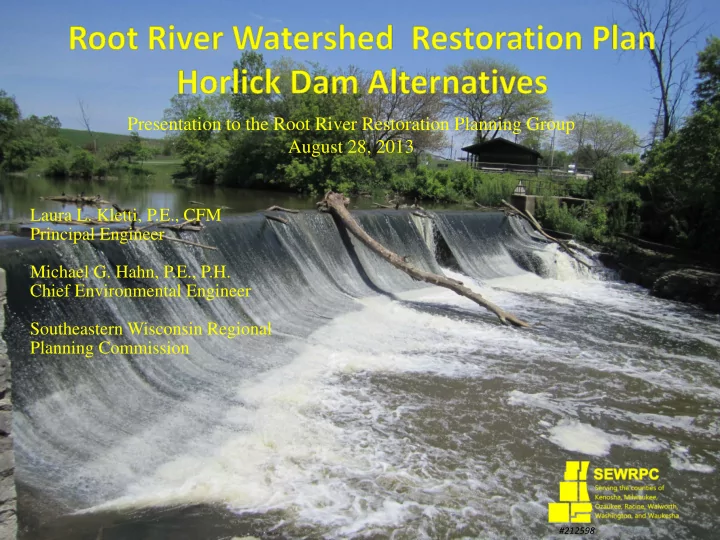

Presentation to the Root River Restoration Planning Group August 28, 2013 Laura L. Kletti, P.E., CFM Principal Engineer Michael G. Hahn, P.E., P.H. Chief Environmental Engineer Southeastern Wisconsin Regional Planning Commission #212598
Partners and Funding Agencies Municipalities and Counties of the Root River Watershed
Plan Approach 1. Second ‐ level plan, building from Recommendations of the 2007 SEWRPC Regional Water Quality Management Plan Update (RWQMPU) 2. Developed four focus issues based on survey and local input: Water quality Habitat Recreational use and access In Racine County only: Flooding and status of the Horlick dam 3. Characterized the watershed concentrating on features related to the four focus issues
Plan Approach 4. Identify targets to be achieved by the end of the five ‐ year plan period 5. For Each Target, Identify Actions to be Taken 6. Identify Foundation Actions 7. Develop an Implementation Strategy
The plan is being documented in: SEWRPC Community Assistance Planning Report No. 316, A Restoration Plan for the Root River Watershed
Alternatives for the Horlick Dam
Reasons for Horlick Dam Evaluation The dam must be upgraded to meet State standards, or demolished and removed. Doing nothing is not an option. Horlick dam break analysis completed by consultant being reviewed now by WDNR Preliminary conclusion is a Significant Hazard rating which requires a 500 ‐ year spillway capacity Significant Hazard dam rating indicates failure would not result in loss of human life but would cause economic and environmental losses
Reasons for Horlick Dam Evaluation Horlick dam as constructed has a 10 ‐ year spillway capacity Once WDNR approves, the County may have up to 10 years to perform modifications to meet the spillway capacity requirement if they choose to maintain the dam
Engineering Process Feasibility Analysis (Conceptual Alternatives) WDNR Hazard Rating Determination WDNR Order Racine County Decision on How to Proceed Preliminary Engineering Final Design Plans and Specifications Construction/Demolition
Horlick Dam Alternatives Issues of Concern Water Quantity Water Quality Natural Resources Social Costs Baseline Condition Conceptual Alternatives
Baseline Conditions
1975 Reconstruction
Baseline Conditions – Side View Flow
Baseline Conditions – 10 ‐ year
Baseline Conditions – 500 ‐ year
Hwy 31 Sediment Volume River Bend NC Horlick dam
Aquatic Invasive Species (AIS) Source: http://en.academic.ru/ Species/Issues of Concern Sea Lamprey Round goby VHS – Viral Hemorrhagic Septicemia Horlick dam as currently constructed is a barrier to AIS based on the WDNR criterion of the 100 ‐ year event WDNR considers the Horlick dam to be most downstream barrier to AIS from Lake Michigan Source: MN DNR Source: Pennsylvania Sea Grant
Safety Concerns Dam / structural failure High flow hazards Boater / fisherman safety Foot access hazards
Alternatives Conceptual Alternatives Modify Dam to Enhance Spillway Capacity Modify Dam to Enhance Spillway Capacity & Provide Fish Passage Under Low and High Flow Conditions Partial Removal Full Removal
Alternative 1 Enhance Spillway Capacity to Meet 500 ‐ year Standard
Alternative 1 – Side View Flow
Hwy 31 Alt 1 & 2 Horlick dam
Alternative 2 Enhance Spillway Capacity and Fish Passage
1915 Fishway
Fishway Examples Source: Ontario Ministry of Natural Resources Source: State of Connecticut
Alternative 3 Partially Remove Dam as Barrier
Alternative 4 Remove Dam
Table 1 Costs Annual Operation Total Present Capital Cost and Maintenance Worth Cost Alternative (dollars) (dollars) (dollars) Alternative 1–500-Year $390,000 $4,500 $461,000 Capacity Alternative 2–Alt 1 with $480,000 $4,700 $555,000 Fishway Alternative 3–Full Notch of $440,000 $2,100 $473,000 Dam Alternative 4–Dam Removal $540,000 $ 700 $551,000
Table 2 Summary Recreation Recreational Access Fish Salmon to River Total Passage and Fishing by Present Flooding Overall Fish Fishing Immediately Riparian Worth Upstream Water Community Upstream Downstream Land Costs Alternative of Dam Quality Improvement Safety Paddling of Dam of Dam Owners (dollars) Baseline Condition 0 0 0 0 0 0 0 0 N/A Alternative 1—500-Year + + + + – + 0 – $461,000 Capacity Alternative 2—Alt 1 with + + ++ + – ++ – – $555,000 Fishway Alternative 3—Full Notch ++ ++ ++ ++ – – +++ – – – – $473,000 of Dam Alternative 4—Dam ++ +++ +++ +++ – – +++ – – – – $551,000 Removal Basis for Evaluation Upstream Loss of Elimination of Loss of Loss of Improved Full Lower flood impound- blockage or structure consist- passage blockage at water elevations ment addition of in River ent upstream dam level lowered fishway water removed removes levels direct access
Additional Work/Information Needs Additional information to be gathered during preliminary engineering for Horlick dam Additional sediment sampling in impoundment Structural integrity issues Dam modification alternatives (Alternatives 1, 2, and 3) Right abutment at Riverside Inn (Alternative 4)
Project Web Site http://www.sewrpc.org/SEWRPC/Environment/Root ‐ River ‐ Watershed ‐ Restoration ‐ Plan.htm • Presentations from public stakeholder meetings • Summary notes from Advisory Group meetings • Draft chapters as they are completed • Comment screen
Recommend
More recommend